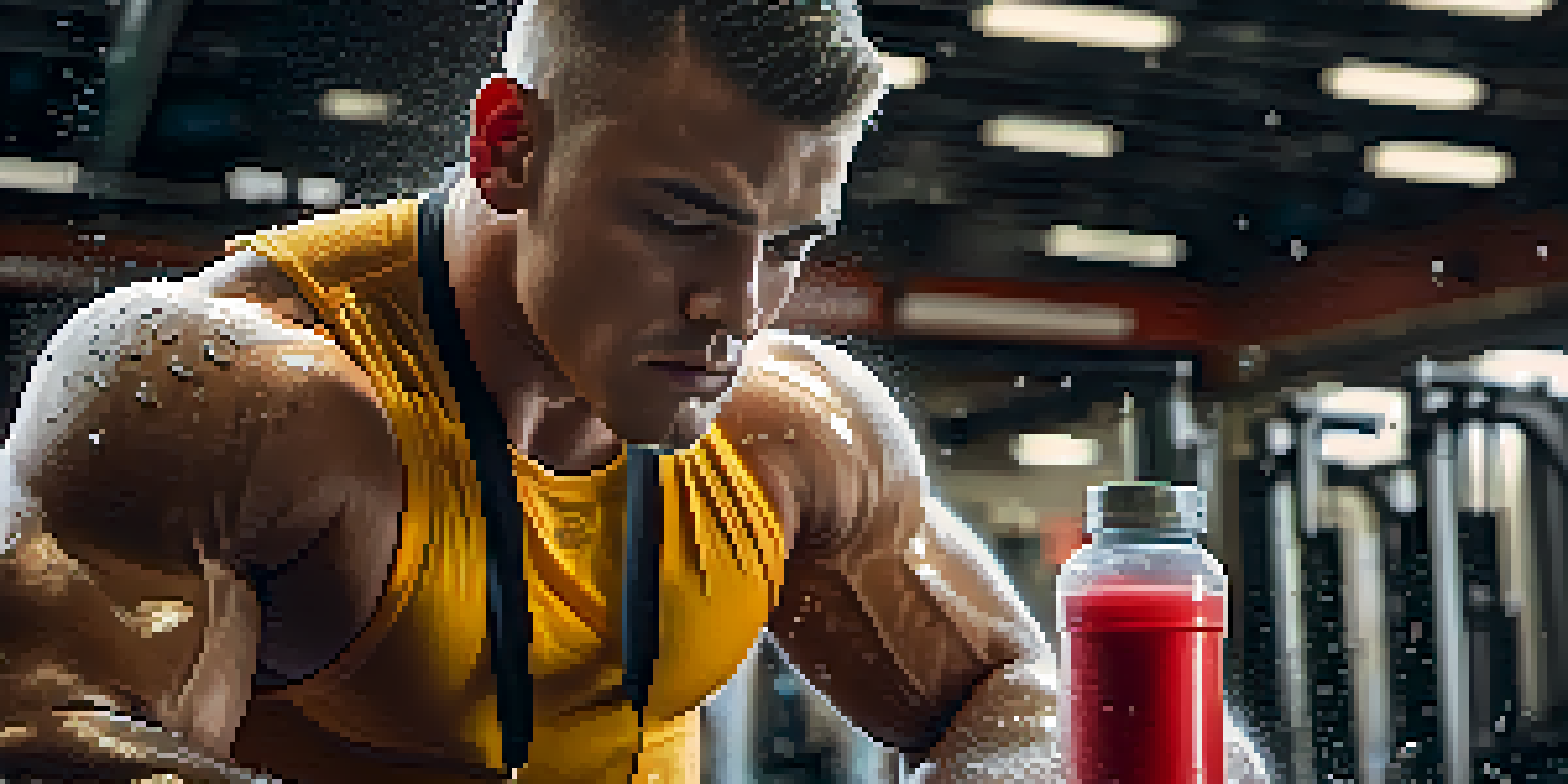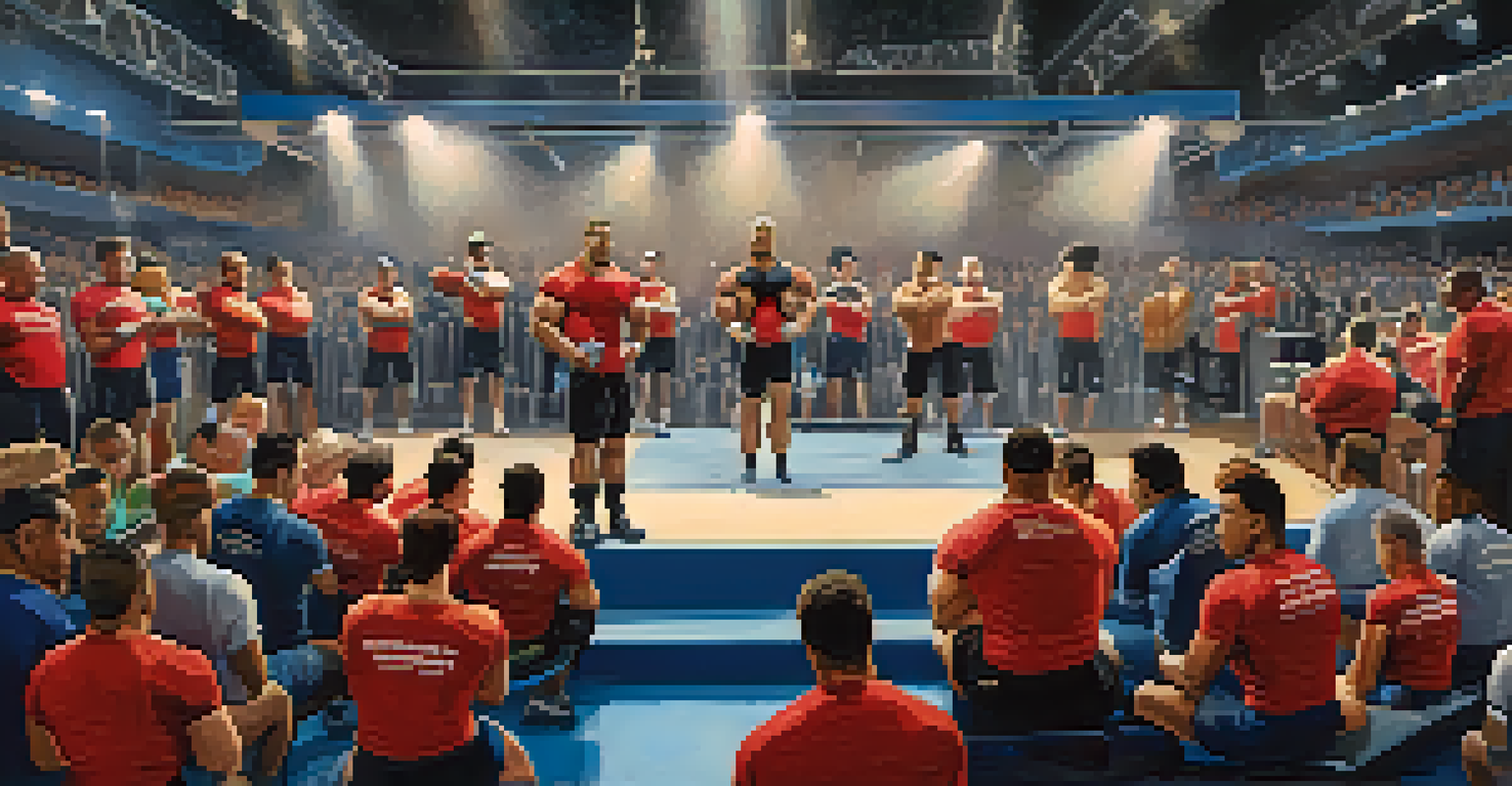Hydration Strategies for Optimal Powerlifting Recovery

Understanding the Importance of Hydration in Recovery
Hydration is a crucial aspect of recovery that many athletes overlook. Proper fluid balance helps to transport nutrients, regulate body temperature, and support muscle function. For powerlifters, hydration can make the difference between a successful lift and a missed opportunity.
Water is the source of life, and when it comes to athletes, hydration is key to unlocking peak performance.
When lifting heavy weights, your body loses fluids through sweat and respiration. This loss can lead to dehydration, which may impair your performance and recovery processes. Staying hydrated ensures that your muscles can recover effectively after intense training sessions.
Moreover, hydration affects your overall energy levels and cognitive function. By maintaining adequate fluid intake, you not only optimize physical recovery but also enhance mental clarity, allowing for better focus in your next training session.
Signs of Dehydration to Watch For
Recognizing the signs of dehydration is key to preventing its negative effects. Common symptoms include thirst, dry mouth, fatigue, and a decrease in performance during workouts. If you notice these signs, it's time to reassess your hydration strategies.

Another telltale sign is the color of your urine. Ideally, it should be pale yellow; dark urine can indicate that you need to drink more fluids. Additionally, headaches and dizziness can be signs that your body is lacking the hydration it needs to function optimally.
Hydration is Key for Recovery
Proper hydration not only aids muscle recovery but also enhances energy levels and cognitive function for better training performance.
If you experience any of these symptoms, it's important to take immediate action. Rehydrating with water or electrolyte-rich beverages can help restore proper fluid balance and support recovery, ensuring you're ready for your next session.
Optimal Hydration Strategies for Powerlifters
To effectively hydrate, start by establishing a daily water intake goal. A common recommendation is to drink at least half your body weight in ounces of water daily. This foundation can be adjusted based on your training intensity and environmental conditions.
Your body is like a car. If you don’t fill it with the right fuel, it won’t run well.
In addition to water, consider incorporating electrolyte-rich drinks, especially after intense workouts. These beverages can replenish lost minerals and help maintain muscle function, which is crucial for recovery. Options like coconut water or sports drinks can be beneficial in this regard.
Pre- and post-workout hydration is also essential. Drinking water before you lift can help prime your body, while rehydrating afterward aids in recovery. Simple practices, like keeping a water bottle nearby during workouts, can make sticking to these strategies easier.
Timing Your Hydration for Maximum Benefit
Timing your hydration can significantly enhance recovery. Aim to drink water consistently throughout the day rather than chugging large amounts at once. This steady intake helps your body efficiently absorb the fluids it needs.
Before your workouts, try to drink 16-20 ounces of water about two hours in advance. This helps ensure your body is well-hydrated when it’s time to lift. During your workout, aim for another 7-10 ounces every 10-20 minutes, especially if you're sweating heavily.
Know the Signs of Dehydration
Recognizing symptoms like dry mouth and dark urine can help you take timely action to prevent dehydration during workouts.
After your training, focus on replenishing lost fluids immediately. Consuming 16-24 ounces of water or an electrolyte drink within 30 minutes post-workout can kickstart the recovery process and prepare you for your next lifting session.
The Role of Electrolytes in Recovery
Electrolytes, like sodium, potassium, and magnesium, play a vital role in hydration and recovery. They help regulate fluid balance, muscle contractions, and nerve function. For powerlifters, maintaining proper electrolyte levels can enhance performance and recovery.
During intense training, you lose electrolytes through sweat. Therefore, it's important to replace them, especially if you're training in hot or humid conditions. Consider incorporating foods rich in electrolytes, like bananas, leafy greens, and nuts, into your diet.
In some cases, a specialized electrolyte drink can be beneficial, particularly after heavy lifting sessions. These drinks can quickly restore your body's balance and ensure you're ready for your next workout, keeping your performance on track.
Hydration and Nutrition: A Dynamic Duo
Hydration and nutrition go hand-in-hand when it comes to recovery. The foods you eat can impact your hydration levels, so it's important to combine good nutrition with your hydration strategies. Foods with high water content, like fruits and vegetables, can help support your overall fluid intake.
Protein-rich foods are also essential for muscle recovery, but they often require additional fluids for digestion. Be mindful of your water intake when consuming protein-heavy meals, as this can aid in nutrient absorption and overall recovery.
Electrolytes Boost Performance
Replacing lost electrolytes through food and drinks is essential for maintaining muscle function and optimizing recovery after intense training.
In essence, a balanced diet paired with adequate hydration ensures that your body has the necessary resources to recover effectively. This synergy can lead to improved performance in your powerlifting journey.
Maintaining Hydration During Competition
Staying hydrated during powerlifting competitions is crucial for optimal performance. With the added excitement and stress of competition, it's easy to forget about your hydration needs. Preparing a hydration plan can help you stay on track.
Before your event, ensure you're well-hydrated by drinking water and electrolyte-rich beverages in the days leading up to competition day. On the day of the event, keep a water bottle handy and take small sips between lifts to maintain your fluid balance.

Remember that competition environments can be unpredictable. Having a backup plan, such as electrolyte gels or portable drinks, can help you stay hydrated even if your usual routine is disrupted. This preparation can be the key to performing your best when it matters most.